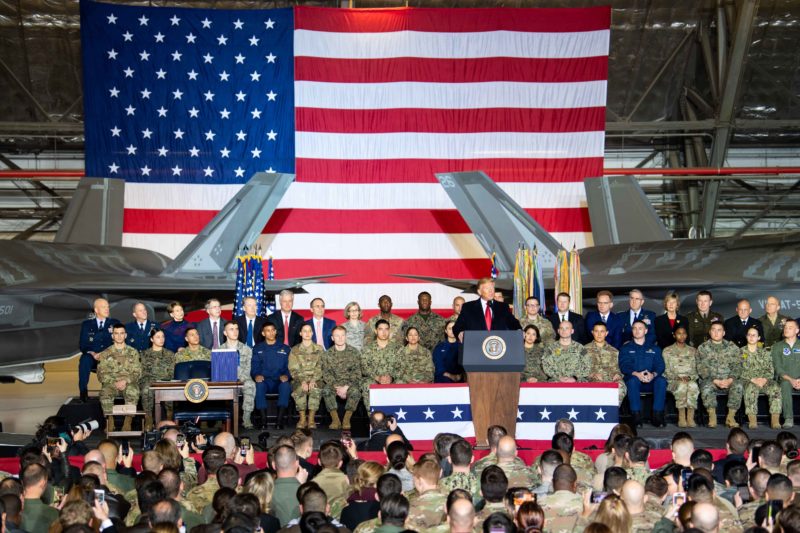Latest News
Commercial Space for National Security is Likely to Accelerate Under Trump, Report Says

President Trump signs the National Defense Authorization Act at Joint Base Andrews, Md., on Dec. 20, 2019, formally establishing the U.S. Space Force. Photo: DoD
The incoming administration of President-elect Trump is likely to propose a ramping up of commercial space to serve national security needs, according to a new paper from the National Security Space Association’s Moorman Center for Space Studies.
“One can confidently predict that rapid fielding of innovative and agile space solutions, including by leveraging commercial space systems and capabilities, will be a central element of the Trump national security space agenda,” according to The Trump Transition and National Security Space: A Status Report by Chris Williams, the chairman of the Moorman Center.
The founder of SpaceX, billionaire Elon Musk, is leading the Trump-created Department of Government Efficiency (DOGE), a supposedly quasi-agency that is to advise the White House Office of Management and Budget on parts of the federal government to cut or eliminate.
“There is every reason to believe that the Trump 47 administration will strongly promote U.S. leadership in space,” Williams wrote in his Moorman Center paper. “Having played a central role in the establishment of the U.S. Space Force and U.S. Space Command and directed other important steps to promote U.S. space leadership during his first term, he is likely to build upon those successes in his second and final term in office.”
“Trump’s attendance at a recent test launch of SpaceX’s Starship booster is a clear indication of his continuing interest in U.S. space activities,” according to Williams.
SpaceX’s Starship rocket is receiving significant funding from the National Aeronautics and Space Administration (NASA) under the Artemis Moon exploration program.
In addition, SpaceX has billions of dollars in U.S. government contracts through launch services, NASA crew transport, Starlink internet service, and the Starshield government version.
Musk and federal regulators have butted heads. Musk has criticized the Federal Communications Commission (FCC) and the Federal Aviation Administration (FAA), including the decision by the FCC revoking nearly $1 billion in funding for Starlink as part of the Rural Digital Opportunity Fund and the FAA for the pace and strictness of commercial launch licensing.
The FAA has fined Musk pittances compared to his vast wealth — $175,000 in February last year for not submitting a mandatory collision avoidance analysis to the FAA before the August 2022 launch of Starlink satellites, a sum paid by SpaceX last October, and more than $633,000 in September for licensing violations in two Falcon 9 launches last year.
Williams wrote that “DOGE could play a significant role in future budget deliberations, including for national security space programs.”
“In addition, DOGE will likely emphasize reducing the regulatory burden on U.S. companies, including space companies,” according to his paper.
Musk and fellow tech billionaire Vivek Ramaswamy are co-chairing the DOGE and are to conclude such work no later than July 4, 2026.
“In terms of priorities, President-elect Trump will likely seek to empower commercial space companies for a variety of space missions, ranging from exploration to national security,” Williams wrote in his Moorman Center report. “In addition, he may provide much needed updates to U.S. space policy in key areas such as protecting and defending vital U.S. space assets, advancing deterrence in space, and promoting U.S. interests in cislunar space. He rightly sees space as an important battleground in the increasingly intense competition between the U.S. and China.”
Stay connected and get ahead with the leading source of industry intel!
Subscribe Now